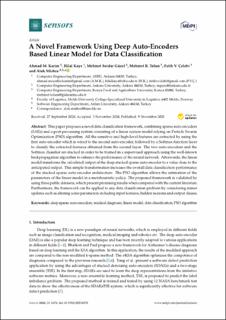A novel framework using deep auto-encoders based linear model for data classification
Peer reviewed, Journal article
Published version

View/
Date
2020Metadata
Show full item recordCollections
- Artikler [396]
- Publikasjoner fra Cristin [413]
Abstract
This paper proposes a novel data classification framework, combining sparse auto-encoders (SAEs) and a post-processing system consisting of a linear system model relying on Particle Swarm Optimization (PSO) algorithm. All the sensitive and high-level features are extracted by using the first auto-encoder which is wired to the second auto-encoder, followed by a Softmax function layer to classify the extracted features obtained from the second layer. The two auto-encoders and the Softmax classifier are stacked in order to be trained in a supervised approach using the well-known backpropagation algorithm to enhance the performance of the neural network. Afterwards, the linear model transforms the calculated output of the deep stacked sparse auto-encoder to a value close to the anticipated output. This simple transformation increases the overall data classification performance of the stacked sparse auto-encoder architecture. The PSO algorithm allows the estimation of the parameters of the linear model in a metaheuristic policy. The proposed framework is validated by using three public datasets, which present promising results when compared with the current literature. Furthermore, the framework can be applied to any data classification problem by considering minor updates such as altering some parameters including input features, hidden neurons and output classes. Keywords: deep sparse auto-encoders, medical diagnosis, linear model, data classification, PSO algorithm
